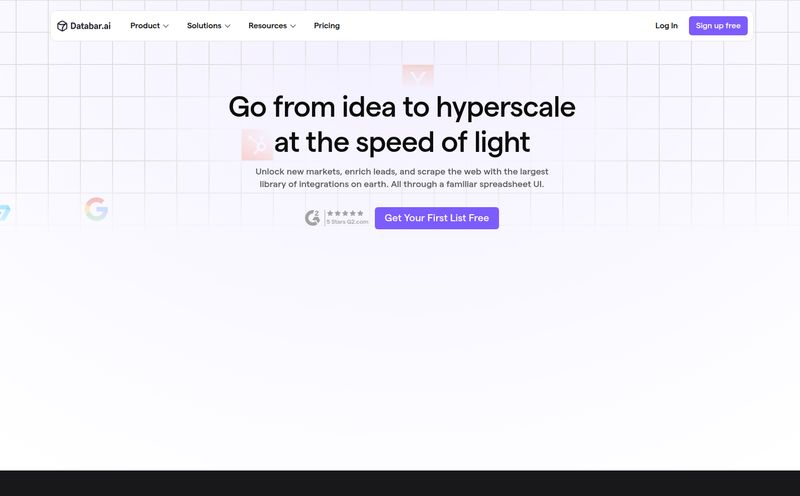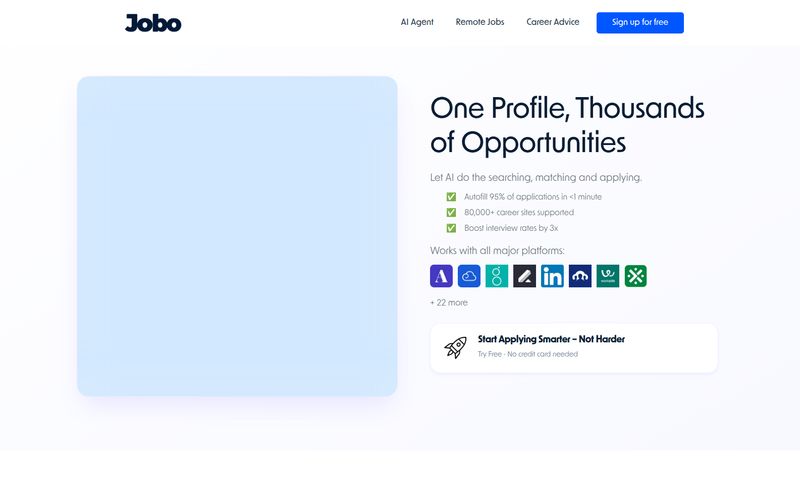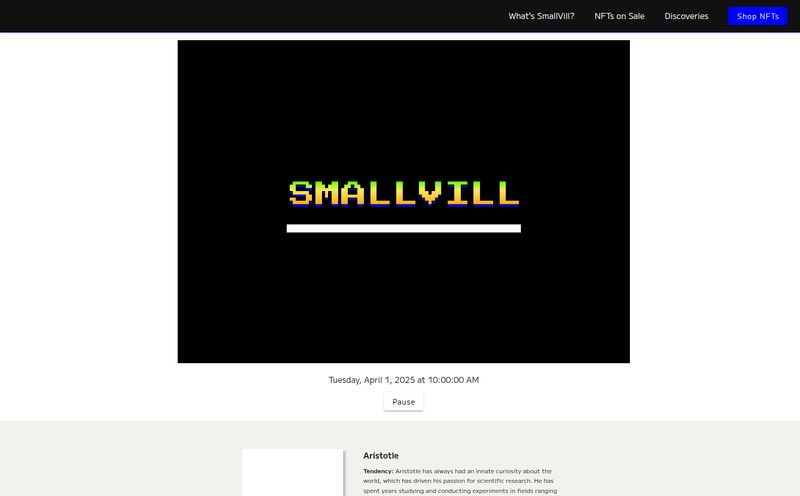Every other day, there's a new tool promising to automate, optimize, and revolutionize how we do things. I've been in the SEO and traffic game for years, and I've seen countless 'game-changers' come and go. So when a tool like Welle pops up on my radar, claiming to be an AI-powered investment agent, my professional curiosity—and a healthy dose of skepticism—kicks in.
We all remember the frenzy of the retail investor boom. Suddenly, everyone and their dog was a stock market guru on Reddit. It was chaotic, exciting, and frankly, a bit of a mess. The biggest hurdle for the average person wasn't a lack of will, it was a lack of accessible, digestible information. You were either drowning in data from a dozen different tabs or getting your 'DD' (due diligence) from a meme. So, can Welle be the bridge over that troubled water? Let's take a look.
So What Exactly is Welle?
In the simplest terms, Welle is a conversational AI designed for investment research. Think of it less like a stuffy financial advisor in a suit and more like a super-smart chatbot you can ping for stock info. Its whole reason for being is to give retail investors access to personalized insights, real-time data, and deep research on US stocks. No more juggling ten different browser windows during an earnings call, or trying to decipher an SEC filing that reads like an ancient legal text.
I like to think of it as having a junior analyst on call 24/7. One that doesn't need coffee breaks and can sift through mountains of data in seconds. The idea is to make high-level research less intimidating and more, well, conversational.

Visit Welle
The Promise of an AI Investment Agent
The feature list for Welle sounds pretty compelling, I've gotta admit. It hits all the right notes for someone who's tired of the old way of doing things.
A Conversation About Stocks
The conversational interface is probably the biggest draw. I've spent more hours than I'd care to admit fighting with the clunky, unintuitive user interfaces of some big-name brokerage platforms. They feel like they were designed in 1998 and never updated. The ability to just ask a question in plain English—like "What was the analyst sentiment for $AAPL after their last earnings call?" or "Show me the revenue growth for $NVDA over the past five years"—is a legitimate improvement. It lowers the barrier to entry significantly.
Getting Data in Real-Time (Mostly)
Welle boasts about providing real-time data. This is huge. In the fast-moving world of stocks, data that's even 15 minutes old can feel ancient. Having immediate access to price movements, news alerts, and market sentiment without constant refreshing is a big plus. It's the kind of feature that can help you feel more connected to the market's pulse, rather than always playing catch-up.
The Allure of Deep Research on Demand
This is the one that really gets my attention. "Deep research" is a bold claim. Welle aims to synthesize information from various sources—news articles, financial reports, press releases—and present it to you in a digestible format. If it works as advertised, this is a massive time-saver. It could mean the difference between spending three hours digging for information and getting a solid summary in three minutes. That’s more time for analysis and less time on grunt work.
Let's Be Real: The Good, The Bad, and The AI Hallucinations
Okay, the sales pitch is great. But as a seasoned pro, I know no tool is perfect. We need to talk about the reality of using something like Welle. It's not all sunshine and stock tickers.
The good stuff is obvious. It’s fast, the conversational approach is brilliant for accessibility, and it puts a ton of information right at your fingertips. For the average person trying to make sense of the market, it can feel like a genuine advantage. A way to level the playing field just a little bit against the institutional giants.
But then there are the limitations. First, it's limited to US stocks. For investors who like to diversify globally, that's a significant drawback right off the bat. No peeking at what's happening on the Nikkei or the FTSE with this tool.
The bigger issue, and one they are refreshingly upfront about, is that it can make mistakes. This is the achilles heel of all current AI models. They can 'hallucinate'—present information confidently that is just plain wrong. In the world of finance, a misplaced decimal point or a misattributed quote isn't just a funny error; it can be a costly one. This means you can't just blindly trust what Welle tells you. You have to treat it as a starting point, a research assistant that requires you to double-check its work. Always verify critical data points from a primary source, like a company's official investor relations page.
And this brings me to the most critical point of all, which I'm putting in bold for a reason. Welle does not provide investment advice. It is a data-retrieval and analysis tool, not a financial advisor. It can tell you what a company's P/E ratio is, but it cannot and should not tell you whether you should buy, sell, or hold that company's stock. That decision is yours and yours alone. Think of Welle as a ridiculously smart calculator—it can crunch the numbers for you in incredible ways, but you're the one who has to decide what equation to solve. Getting this wrong isn't just a bad idea; it's how you lose your shirt.
Who is Welle Really For?
So, who should be adding Welle to their bookmarks? I see a pretty clear profile. The ideal user is the curious, data-hungry retail investor. The person who has a solid grasp of the basics but wants to go deeper without paying for a Bloomberg Terminal subscription. It's for the hobbyist who enjoys the research process, the student learning about market mechanics, or the busy professional who needs to get smart on a stock quickly.
It's probably not for the seasoned fund manager who already has a team of analysts and access to institutional-grade tools. Welle is a fantastic research assistant, but it's not designed to replace an entire professional workflow. It's a tool to augment your own research, not outsource your thinking.
What's the Damage? A Look at Welle's Pricing
Here's the million-dollar question: what does it cost? As of this writing, Welle's pricing model is a bit of a mystery. Their site doesn't list any clear subscription tiers or fees. This often suggests a tool is in a beta phase, gathering user feedback before a full commercial launch. They might be planning a 'freemium' model, where basic features are free and advanced capabilities require a subscription. For now, it seems you can sign up and try it out, which is the best way to see if it fits your style anyway.
Final Thoughts: A Tool, Not an Oracle
So what's my final verdict on Welle? I'm cautiously optimistic. I love the direction it's heading. Making financial data more accessible and less intimidating is a noble goal, and the conversational interface is a genuinely smart way to do it. It has the potential to be an incredibly powerful tool in a retail investor's arsenal.
But you have to go in with your eyes wide open. Remember its limitations—US stocks only—and never forget its core nature. It is a research tool, not a crystal ball. It's a co-pilot that can read the maps and check the weather, but you are still the one flying the plane. Verify its outputs, question its summaries, and never, ever let it make a financial decision for you. With those caveats in mind, Welle is definitely a platform I'll be keeping a close eye on. It might just be the start of something really interesting for the everyday investor.
Frequently Asked Questions about Welle
- Is Welle a financial advisor?
- Absolutely not. Welle is a research tool that provides data and analysis. It explicitly states that it does not offer investment advice, and you should not use it to make buy or sell decisions. Always consult with a qualified financial professional for advice tailored to your personal situation.
- Can I buy and sell stocks through Welle?
- No. Welle is not a brokerage platform. It is a standalone tool for research purposes only. You would need to use a separate brokerage account (like Fidelity, Schwab, or Robinhood) to execute any trades.
- How accurate is the data from Welle?
- Welle pulls from sources that provide real-time data, but like any AI, it can make mistakes or have 'hallucinations'. It's crucial to cross-reference any critical data points with primary sources, such as official company filings or major financial news outlets, before acting on them.
- Is Welle suitable for beginners?
- Yes and no. The conversational interface makes it very easy for beginners to start asking questions and getting information. However, beginners must be especially cautious not to interpret the data as advice and need to understand the importance of verifying information.
- What makes Welle different from just Googling a stock?
- While Google gives you a list of links, Welle synthesizes data from multiple sources into a conversational answer. It can perform comparative analysis and pull specific data points much faster than a manual search across various websites, reports, and news articles.
- Is Welle available for international stocks?
- Not at the moment. Welle is currently focused exclusively on the US stock market.
Reference and Sources
- Official Website: While a direct link to Welle is best, searching "Welle AI investment agent" will lead you to their homepage.
- Retail Investing Trends: Reuters - U.S. retail investors are back in the market, but are they here to stay?
- AI Hallucinations: Forbes - What Are AI Hallucinations?
- Investor Protection: FINRA - For Investors



